|
|
|
Sort Order |
|
|
|
Items / Page
|
|
|
|
|
|
|
| Srl | Item |
| 1 |
ID:
163307
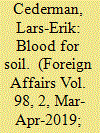

|
|
|
|
|
| Summary/Abstract |
Since the French Revolution, nationalism—the idea that state borders should coincide with national communities—has constituted the core source of political legitimacy around the world. As nationalism spread from western Europe in the early nineteenth century, it became increasingly ethnic in nature. In places where the state and the nation did not match up, such as Germany, Italy, and most of eastern Europe, the nation tended to be defined in terms of ethnicity, which led to violent processes of unification or secession. At the beginning of the twentieth century, ethnic nationalism came to disrupt political borders even more, leading to the breakup of multiethnic empires, including the Habsburg, Ottoman, and Russian ones. By changing the size of Europe’s political units, this undermined the balance of power and contributed to two world wars
|
|
|
|
|
|
|
|
|
|
|
|
|
|
|
|
| 2 |
ID:
163306
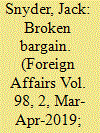

|
|
|
|
|
| Summary/Abstract |
Nationalism and nativism are roiling politics on every continent. With the election of President Donald Trump in the United States, the growing power of right-wing populist parties in Europe, and the ascent of strongmen in states such as China, the Philippines, and Turkey, liberals around the world are struggling to respond to populist nationalism. Today’s nationalists decry the “globalist” liberalism of international institutions. They attack liberal elites as sellouts who care more about foreigners than their fellow citizens. And they promise to put national, rather than global, interests first
|
|
|
|
|
|
|
|
|
|
|
|
|
|
|
|
| 3 |
ID:
163305
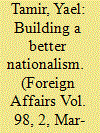

|
|
|
|
|
| Summary/Abstract |
At a rally in Texas last October, U.S. President Donald Trump was delivering his familiar “America first” message, complaining about “corrupt, power-hungry globalists,” when he tried out a new line: “You know, they have a word—it sort of became old-fashioned—it’s called, ‘a nationalist.’ And I say, ‘Really, we’re not supposed to use that word,’” he added, grinning. “You know what I am? I’m a nationalist, OK? I’m a nationalist.” As the crowd cheered, “U.S.A.! U.S.A.!” Trump nodded. “‘Nationalist’: nothing wrong with it. Use that word
|
|
|
|
|
|
|
|
|
|
|
|
|
|
|
|
| 4 |
ID:
163313
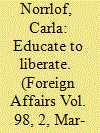

|
|
|
|
|
| Summary/Abstract |
A populist wave is sweeping the Western world. In Austria, Hungary, Italy, Poland, and the United States, populist parties and candidates have entered the government. In France, Germany, Greece, the Netherlands, Sweden, and the United Kingdom, they have won record levels of support and reshaped the political landscape. What makes these victories so disturbing is the characteristic that unites all populists: their rejection of liberal values. If the world once seemed to be moving inexorably toward greater political and economic freedom, human dignity, tolerance, equality, nondiscrimination, open markets, and international cooperation, all are now under threat. That is bad enough, but the decline of liberalism will have consequences beyond a few individual countries. Because the countries that uphold the liberal international order, especially the United States, are turning against liberalism, they risk undermining the order they built, ushering in a more antagonistic and dangerous world.
|
|
|
|
|
|
|
|
|
|
|
|
|
|
|
|
| 5 |
ID:
163298
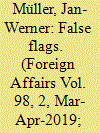

|
|
|
|
|
| Summary/Abstract |
There appears to be one indisputable global trend today: the rise of nationalism. Self-described nationalists now lead not only the world’s largest autocracies but also some of its most populous democracies, including Brazil, India, and the United States. A deepening fault line seems to divide cosmopolitans and nationalists, advocates of “drawbridge down” and “drawbridge up.” And it seems that more and more people are opting for the latter
|
|
|
|
|
|
|
|
|
|
|
|
|
|
|
|
| 6 |
ID:
163308
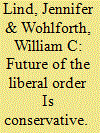

|
|
|
|
|
| Summary/Abstract |
The liberal world order is in peril. Seventy-five years after the United States helped found it, this global system of alliances, institutions, and norms is under attack like never before. From within, the order is contending with growing populism, nationalism, and authoritarianism. Externally, it faces mounting pressure from a pugnacious Russia and a rising China. At stake is the survival of not just the order itself but also the unprecedented economic prosperity and peace it has nurtured
|
|
|
|
|
|
|
|
|
|
|
|
|
|
|
|
| 7 |
ID:
163296
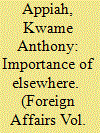

|
|
|
|
|
| Summary/Abstract |
In October 2016, British Prime Minister Theresa May made her first speech to a Conservative conference as party leader. Evidently seeking to capture the populist spirit of the Brexit vote that brought down her predecessor, she spoke of “a sense—deep, profound, and, let’s face it, often justified—that many people have today that the world works well for a privileged few, but not for them.” What was needed to challenge this, May argued, was a “spirit of citizenship” lacking among the business elites that made up one strand of her party’s base. Citizenship, she said, “means a commitment to the men and women who live around you, who work for you, who buy the goods and services you sell.” She continu
|
|
|
|
|
|
|
|
|
|
|
|
|
|
|
|
| 8 |
ID:
163311
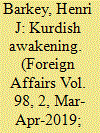

|
|
|
|
|
| Summary/Abstract |
We’ve been fighting for a long time in Syria,” said U.S. President Donald Trump in the last days of 2018. “Now it’s time for our troops to come back home.” The president’s surprise call for a rapid withdrawal of the nearly 2,000 U.S. troops stationed in Syria drew widespread criticism from members of the U.S. foreign policy establishment. But it came as an even greater shock to the United States’ main partner in the fight against the Islamic State (or ISIS), the Syrian Kurds. For weeks prior to the announcement, Turkish President Recep Tayyip Erdogan had been threatening to invade areas of northern Syria controlled by Kurdish militants. The only thing stopping him was the presence of U.S. troops. Removing them would leave the Kurds deeply exposed. “If [the Americans] will leave,” warned one Syrian Kurd, “we will curse them as traitors.”
|
|
|
|
|
|
|
|
|
|
|
|
|
|
|
|
| 9 |
ID:
163315


|
|
|
|
|
| Summary/Abstract |
Most Americans used to think about climate change—to the extent that they thought about it at all—as an abstract threat in a distant future. But more and more are now seeing it for what it is: a costly, human-made disaster unfolding before their very eyes. A wave of increasingly destructive hurricanes, heat spells, and wildfires has ravaged communities across the United States, and both scientists and citizens are able to connect these extreme events to a warming earth. Seven in ten Americans agree that global warming is happening, according to a 2018 study conducted by the Yale Program on Climate Change Communication. About six in ten think it is mostly caused by human activity and is already changing the weather. Four in ten say they have personally experienced its impact. And seven in ten say the United States should enact measures to cut greenhouse gas emissions, including prices and limits on carbon dioxide pollution, no matter what other countries do.
|
|
|
|
|
|
|
|
|
|
|
|
|
|
|
|
| 10 |
ID:
163295


|
|
|
|
|
| Summary/Abstract |
In 1986, the Pulitzer Prize–winning, bowtie-wearing Stanford historian Carl Degler delivered something other than the usual pipe-smoking, scotch-on-the-rocks, after-dinner disquisition that had plagued the evening program of the annual meeting of the American Historical Association for nearly all of its centurylong history. Instead, Degler, a gentle and quietly heroic man, accused his colleagues of nothing short of dereliction of duty: appalled by nationalism, they had abandoned the study of the nation.I
|
|
|
|
|
|
|
|
|
|
|
|
|
|
|
|
| 11 |
ID:
163312


|
|
|
|
|
| Summary/Abstract |
The quarter century following the Cold War was the most peaceful in modern history. The world’s strongest powers did not fight one another or even think much about doing so. They did not, on the whole, prepare for war, anticipate war, or conduct negotiations and political maneuvers with the prospect of war looming in the background. As U.S. global military hegemony persisted, the possibility of developed nations fighting one another seemed ever more remote.
|
|
|
|
|
|
|
|
|
|
|
|
|
|
|
|
| 12 |
ID:
163310


|
|
|
|
|
| Summary/Abstract |
Like most national elections in India, the one coming this spring will be decided in the mofussil. Originally a colonial term for any town outside the commercial capitals of the British Raj, mofussil now refers to the provincial areas beyond the burgeoning megacities of Mumbai and New Delhi, that is, to the rural and impoverished stretches where two out of three Indians live.
|
|
|
|
|
|
|
|
|
|
|
|
|
|
|
|
| 13 |
ID:
163299
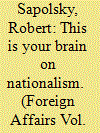

|
|
|
|
|
| Summary/Abstract |
He never stood a chance. His first mistake was looking for food alone; perhaps things would have turned out differently if he’d been with someone else. The second, bigger mistake was wandering too far up the valley into a dangerous wooded area. This was where he risked running into the Others, the ones from the ridge above the valley. At first, there were two of them, and he tried to fight, but another four crept up behind him and he was surrounded. They left him there to bleed to death and later returned to mutilate his body. Eventually, nearly 20 such killings took place, until there was no one left, and the Others took over the whole valley.
|
|
|
|
|
|
|
|
|
|
|
|
|
|
|
|
| 14 |
ID:
163309


|
|
|
|
|
| Summary/Abstract |
The United States’ annual budget deficit is set to reach nearly $1 trillion this year, more than four percent of GDP and up from $585 billion in 2016. As a result of the continuing shortfall, over the next decade, the national debt—the total amount owed by the U.S. government—is projected to balloon from its current level of 78 percent of GDP to 105 percent of GDP. Such huge amounts of debt are unprecedented for the United States during a time of economic prosperity.
|
|
|
|
|
|
|
|
|
|
|
|
|
|
|
|
| 15 |
ID:
163297


|
|
|
|
|
| Summary/Abstract |
Nationalism has a bad reputation today. It is, in the minds of many educated Westerners, a dangerous ideology. Some acknowledge the virtues of patriotism, understood as the benign affection for one’s homeland; at the same time, they see nationalism as narrow-minded and immoral, promoting blind loyalty to a country over deeper commitments to justice and humanity. In a January 2019 speech to his country’s diplomatic corps, German President Frank-Walter Steinmeier put this view in stark terms: “Nationalism,” he said, “is an ideological poison.”
|
|
|
|
|
|
|
|
|
|
|
|
|
|
|
|
|
|
|
|
|